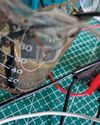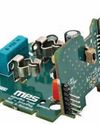"We Refer To The 28-NANOMETRE NODE As The 'GOLDILOCKS' NODE"
Electronics For You
|February 2024
Incubated at IIT Madras, the fabless semiconductor startup, Mindgrove Technologies, has developed a microcontroller chip operating on a 28-nanometre technology node with a SHAKTI core, at a speed of 700MHz for loT applications, signal processing, machine learning, and characterisation in signal processing and vision domains.

Why did you choose to work with a 28-nanometre technology node?
Sharan: Internally, we refer to the 28-nanometre process node as the ‘Goldilocks node’ because it offers sufficient speed, incorporates power-saving features in the node’s design, and is relatively cost-effective. It is the last process node where traditional planar transistors are used before transitioning to FinFET transistors, which are more complex and expensive, particularly in the case of 16-nanometre and lower nodes. Developing for FinFET nodes presents greater challenges and costs, making 28 nanometres an ideal choice that provides the desired performance, power efficiency, and manageability of process technology without breaking the bank. Hence, the fitting nickname ‘Goldilocks.’
Shashwath: Though it was not a primary factor in our decisionmaking, the 28-nanometre process node does not pose export control issues from the US. Access to this node is freely granted. In contrast, for the latest process nodes, a separate licence is required, and the associated paperwork could have caused significant delays, possibly extending to around six months or even longer. So, beyond its technical advantages, the 28-nanometre node also offers streamlined access, aligning perfectly with our needs for the first year of development.
Can you give me an example of where 28-nanometre nodes are used in real life?
Sharan: Xilinx FPGAs, such as Artix 100 and DS 200, are typically fabricated at 28 nanometres. The first-generation Vertex 7 series was produced at 28 nanometres. The very first version of the Apple Watch was manufactured using a 28-nanometre process. Many automotive chips are manufactured using the 28-nanometre process.
Denne historien er fra February 2024-utgaven av Electronics For You.
Abonner på Magzter GOLD for å få tilgang til tusenvis av kuraterte premiumhistorier og over 9000 magasiner og aviser.
Allerede abonnent? Logg på
FLERE HISTORIER FRA Electronics For You

Electronics For You
Tech Majors Are Racing TOWARDS NET-ZERO - What About You?
Apple, Microsoft, Amazon, Google, Infosys, Wipro—global and Indian firms are heading closer to achieving net-zero emissions, a mandate to combat climate change. Here is what you need to know to start your journey...
12 mins
December 2025

Electronics For You
Miniature IoT WATER TDS And LEVEL MONITOR Cum CONTROLLER
For setups that rely on stored water, clear awareness of tank level and water quality is essential.
3 mins
December 2025

Electronics For You
The Impact Of GENERATIVE AI On The Future Of AUTOMOTIVE AND EVs
Autonomous vehicles, connected ecosystems, and smart factories are only the beginning. Generative Al is pushing the auto industry beyond predictions into a bold era of creativity-from EV design to real-time diagnostics and showroom automation. Here is how GenAl is reshaping innovation across the automotive value chain.
8 mins
December 2025

Electronics For You
How AI Tools Are Making SOFTWARE DEVELOPMENT BETTER
AI is reshaping how we code, debug, and collaborate. From Copilot to automation, it is changing software development in ways worth exploring.
3 mins
December 2025
Electronics For You
How AI Tools Are Making SOFTWARE DEVELOPMENT BETTER
AI is reshaping how we code, debug, and collaborate. From Copilot to automation, it is changing software development in ways worth exploring.
3 mins
December 2025

Electronics For You
5 Interesting Reference Designs FOR SMART HOMES
Smart home devices are transforming the way people interact with their appliances. They make homes more convenient, secure, and energy-efficient. From smart plugs and energy monitors to smart locks and thermostats, reference designs help design engineers create connected products that are easy to use, consume less power, and are reliable. These designs allow you to control devices remotely, track energy use, extend battery life, and automate routines. They provide practical solutions for upgrading homes and small commercial spaces without major modifications.
3 mins
December 2025

Electronics For You
Fancy USB LED VASE
This USB LED vase is a simple yet elegant device that fuses art with electronics to create a decorative lighting display. Powered directly from a standard USB port, it uses readily available components such as MOSFETs, resistors, capacitors, and LEDs to produce a striking, dynamic sequence of lights.
3 mins
December 2025

Electronics For You
"WHAT OTHERS SELL IN FOUR BOXES WE BUILT IN ONE"
Years of custom field work are shaping a product line with its own cloud, its own hardware, and a market that is now beginning to recognise its value.
8 mins
December 2025

Electronics For You
BUILD LARGE LANGUAGE MODELS
Large language models are machine learning models designed for a range of language-related tasks such as text generation and translation. Here’s how open source software can help you build your own large language model.
6 mins
December 2025

Electronics For You
Rare Earth Or Rare Ingenuity? India Remains Between The Two
With China firmly controlling rare earth exports, India confronts a critical moment in its technological trajectory.
8 mins
December 2025
Listen
Translate
Change font size

